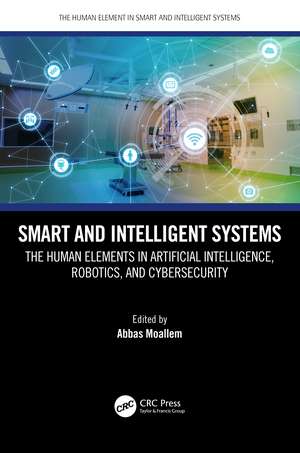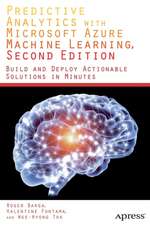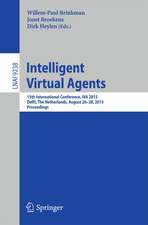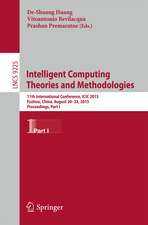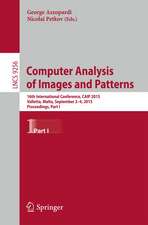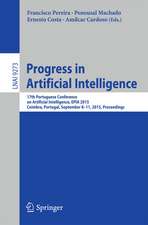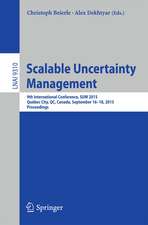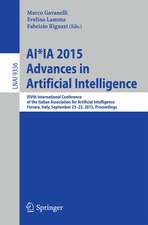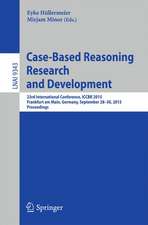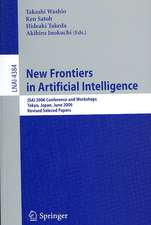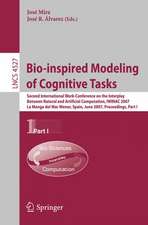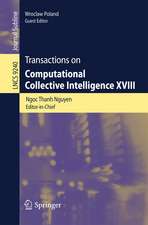Smart and Intelligent Systems: The Human Elements in Artificial Intelligence, Robotics, and Cybersecurity: The Human Element in Smart and Intelligent Systems
Editat de Abbas Moallemen Limba Engleză Hardback – 29 dec 2021
"Robots, drones, self-driving cars, and personal assistants are only some of the ‘intelligent’ and ‘smart’ systems which are populating our world and changing the way we use technology to carry out our everyday activities, bringing about both exciting opportunities for human-technology symbiosis, as well as compelling design and development challenges. Through a carefully selected choice of chapters, authored by top scientists in the field, this book, edited by Abbas Moallem, sheds light on fundamental aspects of intelligent and smart systems, investigating the role and impact of affective and psychophysiological computing, machine learning, cybersecurity, agent transparency, and human-agent teaming in the shaping of this new interaction paradigm, as well as the human factors involved in their application in critical domains such as health, education, and manufacturing in the emerging technological landscape."—Constantine Stephanidis, Professor of Computer Science, University of Crete, Distinguished member of Foundation for Research and Technology - Hellas (FORTH)
In today’s digital world, the words "smart" and intelligent" are now used to label devices, machinery, systems, and even environments. What is a "smart" system? Is "smart" synonymous with "intelligent"? If not, what does an "intelligent system" mean? Are all smart systems intelligent? This book tries to answer these questions by summarizing the existing research in various areas and providing new research findings.
Smart and Intelligent Systems: The Human Elements in Artificial Intelligence, Robotics, and Cybersecurity presents new areas of smart and intelligent system design. It defines smart and intelligent systems, offers a human factors approach, discusses networking applications, and combines the human element with smart and intelligent systems.
This book is perfect for engineering students in data sciences and artificial intelligence and practitioners at all levels in the fields of human factors and ergonomics, systems engineering, computer science, software engineering, and robotics.
| Toate formatele și edițiile | Preț | Express |
|---|---|---|
| Paperback (1) | 373.53 lei 6-8 săpt. | |
| CRC Press – 27 mai 2024 | 373.53 lei 6-8 săpt. | |
| Hardback (1) | 816.53 lei 6-8 săpt. | +156.58 lei 4-10 zile |
| CRC Press – 29 dec 2021 | 816.53 lei 6-8 săpt. | +156.58 lei 4-10 zile |
Preț: 816.53 lei
Preț vechi: 1020.66 lei
-20% Nou
Puncte Express: 1225
Preț estimativ în valută:
156.26€ • 162.54$ • 129.00£
156.26€ • 162.54$ • 129.00£
Carte tipărită la comandă
Livrare economică 14-28 aprilie
Livrare express 07-13 martie pentru 166.57 lei
Preluare comenzi: 021 569.72.76
Specificații
ISBN-13: 9780367461492
ISBN-10: 0367461498
Pagini: 188
Ilustrații: 22
Dimensiuni: 156 x 234 x 13 mm
Greutate: 0.42 kg
Ediția:1
Editura: CRC Press
Colecția CRC Press
Seria The Human Element in Smart and Intelligent Systems
ISBN-10: 0367461498
Pagini: 188
Ilustrații: 22
Dimensiuni: 156 x 234 x 13 mm
Greutate: 0.42 kg
Ediția:1
Editura: CRC Press
Colecția CRC Press
Seria The Human Element in Smart and Intelligent Systems
Public țintă
Academic, Professional, Professional Practice & Development, and Undergraduate AdvancedCuprins
Chapter 1: Smart Educational System
Chapter 2.Intelligent Affect Sensitive Tutoring Systems – An Evaluative Case Study and Future Directions
Chapter 3: User State Assessment in Adaptive Intelligent Systems
Chapter 4: Agent Transparency
Chapter 5: Smart Telehealth Systems for the Aging Population
Chapter 6: Social Factors in Human-Agent Teaming
Chapter 7: Human elements in ML-based solutions to cybersecurity
Chapter 8: Cybersecurity in Smart and Intelligent Manufacturing
Chapter 2.Intelligent Affect Sensitive Tutoring Systems – An Evaluative Case Study and Future Directions
Chapter 3: User State Assessment in Adaptive Intelligent Systems
Chapter 4: Agent Transparency
Chapter 5: Smart Telehealth Systems for the Aging Population
Chapter 6: Social Factors in Human-Agent Teaming
Chapter 7: Human elements in ML-based solutions to cybersecurity
Chapter 8: Cybersecurity in Smart and Intelligent Manufacturing
Notă biografică
Abbas Moallem Dr. Abbas Moallem is a consultant and adjunct professor at San Jose State University, California where he teaches human-computer interaction, cybersecurity, information visualization and human factors. He is the program chair of HCI-CPT, the International Conference on HCI for Cybersecurity, Privacy and Trust.
Recenzii
"The more we know about smart intelligent systems and their use the more productive organizations can become and quality and ease of life improve."–––Gavriel Salvendy, President Academy of Science, Engineering and Medicine of Florida, University Distinguished Professor University of Central Florida""Robots, drones, self-driving cars, and personal assistants are only some of the ‘intelligent’ and ‘smart’ systems which are populating our world and changing the way we use technology to carry out our everyday activities, bringing about both exciting opportunities for human-technology symbiosis, as well as compelling design and development challenges. Through a carefully selected choice of chapters, authored by top scientists in the field, this book, edited by Abbas Moallem sheds light on fundamental aspects of intelligent and smart systems, investigating the role and impact of affective and psychophysiological computing, machine learning, cybersecurity, agent transparency, and human-agent teaming in the shaping of this new interaction paradigm, as well as the human factors involved in their application in critical domains such as health, education, and manufacturing in the emerging technological landscape." ––––Constantine Stephanidis, Professor of Computer Science, University of Crete, Distinguished member of Foundation for Research and Technology - Hellas (FORTH)
Descriere
In today’s digital world, the words “smart” and intelligent” are now used to label devices, machinery, systems, and even environments. What is a “smart” system? Is “smart” synonymous to “intelligent”? If not, what does an “intelligent system” mean? Are all the smart systems intelligent?
